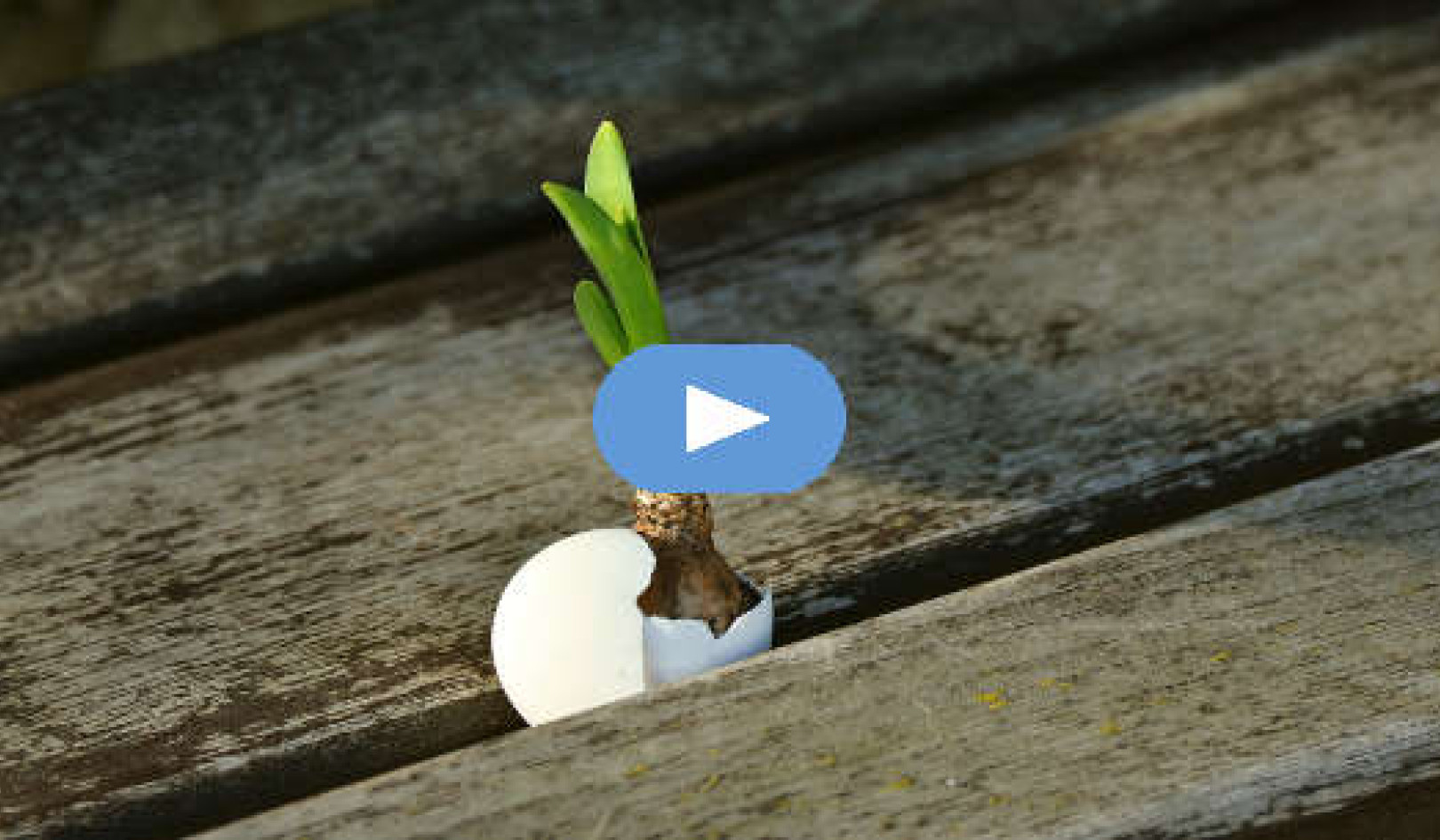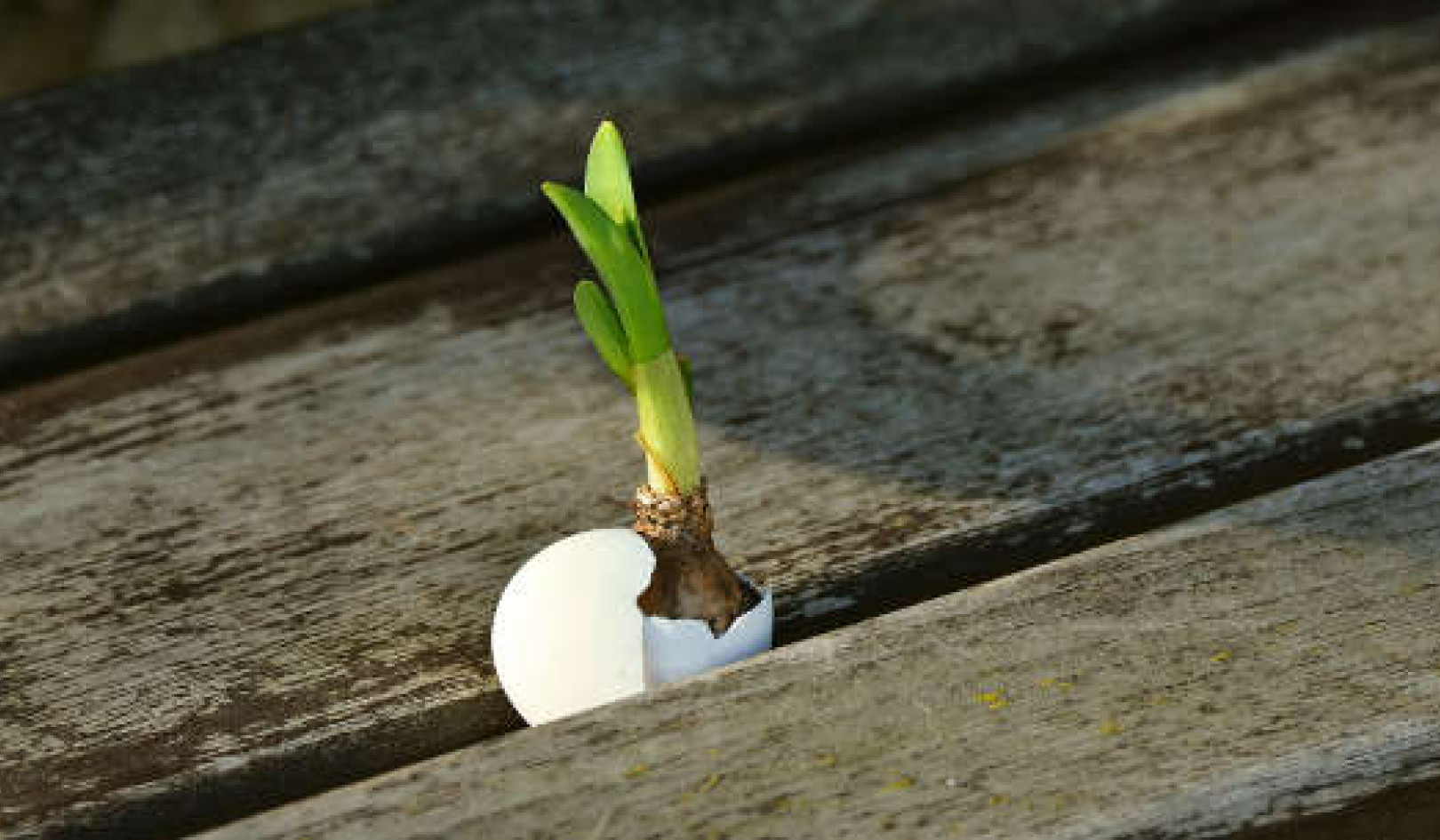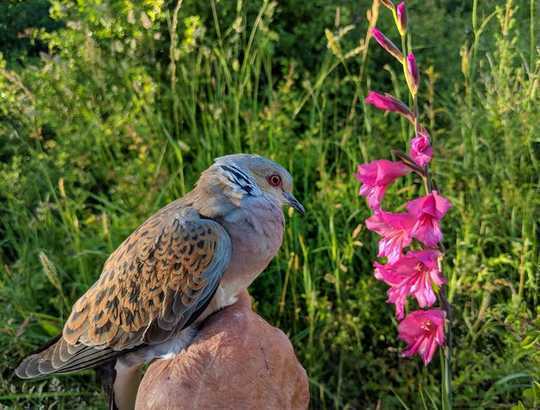 Rebecca Young, Author provided
Rebecca Young, Author provided
The 12 Days of Christmas is a song that promises a great deal, but there’s a line that carollers may have to omit in future. Before a whole house of leaping lords and dancing ladies, the second day is supposed to bring two turtle doves. But dramatic declines in populations across Europe may mean that day two disappoints true loves in Christmases to come.
Only slightly larger than a blackbird, the European turtle dove is the UK’s smallest species of pigeon, as well as its only migrant species. You would be hard pushed to find turtle doves in the UK during December, as they spend the winter in sub-Saharan Africa, returning to Europe to breed in late April. With their return comes their gentle purring song, a long-standing sign of spring.
Once widespread across England and Wales, the UK turtle dove population plummeted by 98% between 1970 and 2015, with similar declines across Europe. So what’s happening to this icon of the festive season?
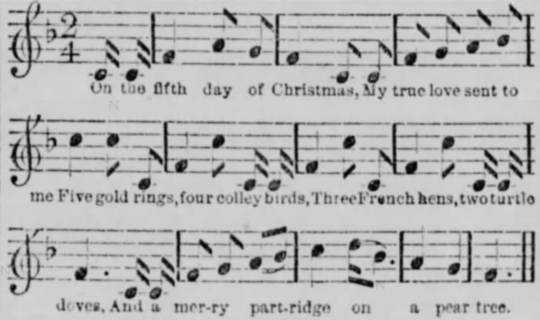 The melody and early lyrics of ‘The 12 Days of Christmas’ song, recorded by Frank Kidson in the Leeds Mercury, 1891. Frank Kidson
The melody and early lyrics of ‘The 12 Days of Christmas’ song, recorded by Frank Kidson in the Leeds Mercury, 1891. Frank Kidson
Dovetailing destruction
Turtle doves only eat seeds, and their first choice is weed seeds. Since the second world war, farming has drastically intensified across Europe and while this has also increased food production, it has decimated the food sources of turtle doves and other farmland birds, mammals and insects. Cutting back wild field margins, increasing herbicide use and sowing crops in autumn instead of spring have all contributed to the disappearance of wildflowers. With less of this habitat and food available, species are forced to feed more on easily accessible, man-made food sites, like stored or spilt grain on farms and garden bird feeders.
This has increased the risk of diseases spreading where birds congregate to feed. Just as diseases tend to spread on public transport, when large numbers of people come into close contact, the same is true for birds at garden feeders. Fewer wild sources of food are also blamed for the later arrival of turtle doves in Europe and their earlier migration to Africa, reducing their possible breeding time. Turtle doves can lay up to three clutches of eggs per season, but with less time to breed, they’re raising fewer chicks. As conservation scientists, we think this effect alone could explain most of the decline that’s been seen over the last 50 years.
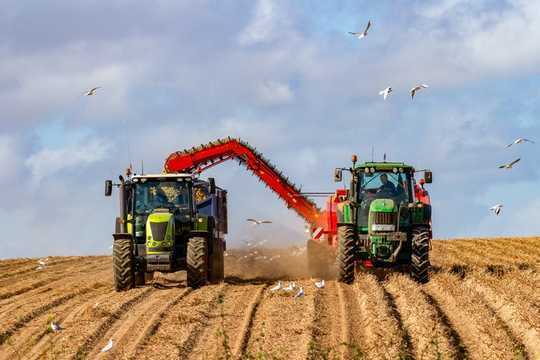 The UK countryside now offers few good places to eat and rest for turtle doves. Ian_Sherriffs/Shutterstock
The UK countryside now offers few good places to eat and rest for turtle doves. Ian_Sherriffs/Shutterstock
But turtle doves are also killed by recreational hunters, and although they’re widely protected, hunting was permitted in ten EU countries as recently as 2018, with more than a million birds killed each year in France, Spain and Portugal, along the western migratory route which UK birds travel. Hunting at these levels is likely to prevent turtle dove populations from recovering, even with restrictions on the timing of hunting and the numbers of birds shot.
As migrants, turtle doves are threatened by what’s known as multiple jeopardy – they face challenges in African wintering grounds as well as in their European breeding grounds. Squeezed out of both habitats, migrant species tend to suffer more severe declines than their sedentary counterparts.
How to help
As a PhD candidate studying turtle doves, I’ve had the privilege of working with these beautiful birds in their natural habitat. I saw thousands of turtle doves leaving one prominent winter roosting site in Senegal – an amazing sight to behold, considering their rarity back in the UK. On a trip to Hungary, one of the only countries in Europe that’s home to a stable population of turtle doves, I heard them singing and saw pairs fluttering between trees. Having spent the majority of my time over the past two years reading about how poorly this species is faring, these moments were truly invigorating.
I’m hopeful that the work of Operation Turtle Dove, an effort by four UK conservation organisations, can counter the problems facing the species. This includes helping farmers look after wildlife by reintroducing uncropped field margins where the plants that doves like to eat can grow. Conservationists are also working closely with hunting organisations in Europe to ensure the activity is sustainable. They’ve already succeeded in reducing the hunting allowance in France.
Anybody can help by simply reporting a turtle dove sighting on the British Trust for Ornithology’s BirdTrack website. This can help target conservation efforts where they’ll have the greatest impact. Turtle dove-friendly habitats can sprout up in British gardens and parks too, encouraging the spring visitors to feed and nest. All it takes is planting the food species they like, such as fumitory and red and white clover, or allowing hedges to grow for the birds to nesting.
If people act now, they can safeguard the purr of spring in the British countryside, and make sure no one goes empty handed on the second day of Christmas.![]()
About the Author
Rebecca Young, PhD Candidate in Conservation and Ecology, Cardiff University
This article is republished from The Conversation under a Creative Commons license. Read the original article.
Related Books
Life After Carbon: The Next Global Transformation of Cities
by Peter Plastrik , John Cleveland The future of our cities is not what it used to be. The modern-city model that took hold globally in the twentieth century has outlived its usefulness. It cannot solve the problems it helped to create—especially global warming. Fortunately, a new model for urban development is emerging in cities to aggressively tackle the realities of climate change. It transforms the way cities design and use physical space, generate economic wealth, consume and dispose of resources, exploit and sustain the natural ecosystems, and prepare for the future. Available On Amazon
The future of our cities is not what it used to be. The modern-city model that took hold globally in the twentieth century has outlived its usefulness. It cannot solve the problems it helped to create—especially global warming. Fortunately, a new model for urban development is emerging in cities to aggressively tackle the realities of climate change. It transforms the way cities design and use physical space, generate economic wealth, consume and dispose of resources, exploit and sustain the natural ecosystems, and prepare for the future. Available On Amazon
The Sixth Extinction: An Unnatural History
by Elizabeth Kolbert Over the last half-billion years, there have been Five mass extinctions, when the diversity of life on earth suddenly and dramatically contracted. Scientists around the world are currently monitoring the sixth extinction, predicted to be the most devastating extinction event since the asteroid impact that wiped out the dinosaurs. This time around, the cataclysm is us. In prose that is at once frank, entertaining, and deeply informed, New Yorker writer Elizabeth Kolbert tells us why and how human beings have altered life on the planet in a way no species has before. Interweaving research in half a dozen disciplines, descriptions of the fascinating species that have already been lost, and the history of extinction as a concept, Kolbert provides a moving and comprehensive account of the disappearances occurring before our very eyes. She shows that the sixth extinction is likely to be mankind's most lasting legacy, compelling us to rethink the fundamental question of what it means to be human. Available On Amazon
Over the last half-billion years, there have been Five mass extinctions, when the diversity of life on earth suddenly and dramatically contracted. Scientists around the world are currently monitoring the sixth extinction, predicted to be the most devastating extinction event since the asteroid impact that wiped out the dinosaurs. This time around, the cataclysm is us. In prose that is at once frank, entertaining, and deeply informed, New Yorker writer Elizabeth Kolbert tells us why and how human beings have altered life on the planet in a way no species has before. Interweaving research in half a dozen disciplines, descriptions of the fascinating species that have already been lost, and the history of extinction as a concept, Kolbert provides a moving and comprehensive account of the disappearances occurring before our very eyes. She shows that the sixth extinction is likely to be mankind's most lasting legacy, compelling us to rethink the fundamental question of what it means to be human. Available On Amazon
Climate Wars: The Fight for Survival as the World Overheats
by Gwynne Dyer Waves of climate refugees. Dozens of failed states. All-out war. From one of the world’s great geopolitical analysts comes a terrifying glimpse of the strategic realities of the near future, when climate change drives the world’s powers towards the cut-throat politics of survival. Prescient and unflinching, Climate Wars will be one of the most important books of the coming years. Read it and find out what we’re heading for. Available On Amazon
Waves of climate refugees. Dozens of failed states. All-out war. From one of the world’s great geopolitical analysts comes a terrifying glimpse of the strategic realities of the near future, when climate change drives the world’s powers towards the cut-throat politics of survival. Prescient and unflinching, Climate Wars will be one of the most important books of the coming years. Read it and find out what we’re heading for. Available On Amazon
From The Publisher:
Purchases on Amazon go to defray the cost of bringing you InnerSelf.comelf.com, MightyNatural.com, and ClimateImpactNews.com at no cost and without advertisers that track your browsing habits. Even if you click on a link but don't buy these selected products, anything else you buy in that same visit on Amazon pays us a small commission. There is no additional cost to you, so please contribute to the effort. You can also use this link to use to Amazon at any time so you can help support our efforts.




















